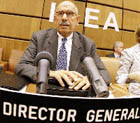Six parties prepare for difficult Geneva talks with Iran
 After weeks of wrangling, delegates of the main nuclear powers and Germany were landing in Geneva Wednesday and making final preparations ahead of their meeting with Iran, the nuclear programme of which they hope to focus on.
After weeks of wrangling, delegates of the main nuclear powers and Germany were landing in Geneva Wednesday and making final preparations ahead of their meeting with Iran, the nuclear programme of which they hope to focus on.
Set to begin Thursday morning at a quiet villa along Lake Geneva, the parties, in particular the Western allies, will aim to make headway on slow moving negotiations, amid growing concerns that Iran is aiming to develop weapons of mass destruction.
"We can talk about other issues ... but it has to be clear it is about the one theme that is worrying the international community," Berlin's Foreign Ministry spokesman Jens Ploetner said on Wednesday.
Britain, China, France, Russia and the United States - the so called P5 (five nuclear powers) - along with Germany, would be represented by Javier Solana, the European Union's foreign policy chief and would also be sending their own delegations.
Differences between the P5+1 lingered, even as the start of negotiations neared.
Russian officials say they would consider sanctions at a later stage, but Moscow, which was sending a deputy minister to the talks, was still pushing mainly for diplomacy.
China, dispatching a lower-level delegation to Switzerland, said it too wants a diplomatic solution and appeared to be in opposition, at this point, to any tough international sanctions that would stop the export of oil.
As preparation for the talks continued, though, the United States and its European partners were considering just that: new sanctions on the Islamic republic, if the talks were to fail.
Prime Minister Gordon Brown of Britain and French President Nicolas Sarkozy have been the clearest, calling for swiftly imposing United Nations Security Council sanctions if Iran does not soon clarify its nuclear ambitions and allow International Atomic Energy Agency inspectors into the site.
The council has already hit Iran with three rounds of sanctions.
US President Barack Obama has put Iran "on notice" and demanded it come clean on its entire nuclear programme, including research aspects, and allow inspectors unfettered access.
Officials in Washington say they want a "meaningful dialogue" with the Islamic republic, with whom they have not had proper diplomatic relations in 30 years. However, the US and its ally Israel, which is believed to have undeclared nuclear arms, have not ruled out military action.
Iran, for its part, says its nuclear programme is for peaceful purposes, mainly to supply energy to the country, and wants negotiations to touch on a wide range of issues, including peace in the Middle East.
It remained unclear how much Iran's chief negotiator Saeed Jalili will be willing to discuss Tehran's own programme, but his team was likely prepared for a more general discussion on nuclear non- proliferation.
"We prefer to build up friendship and understanding (with the world powers) and are prepared for long negotiations," President Mahmoud Ahmadinejad of Iran said.
The West last week accused Tehran of deliberately concealing from UN inspectors a second nuclear plant in the southern part of the country for enriching uranium, a claim Iran says is overstated, but the issue raised tensions in an already tight situation.
"They have been on the wrong side of the law, you know, in so far as informing the agency about the construction, and as you have seen it, it has created concern in the international community," countered IAEA chief Mohamed ElBaradei in a television interview, the night before the talks began.
Under IAEA regulations, officials at the agency have said that Iran should have informed the watchdog over a year ago, as soon as it made the decision to build the second plant.
ElBaradei said that he had no "credible evidence" Iran was currently working on a weapons programme. This was in line with beliefs at US intelligence branches though the British believe the country is working towards a nuclear warhead, according to a Financial Times report.
The US team was being headed by William Burns, undersecretary of state for political affairs, who was present at the first round of Geneva talks last year.
The delegations have made plans for a second day of talks, though officially only one was announced. Should the delegates meet more than once, that could, in the eyes of several diplomats, be seen as a positive sign.
Expectations going into the lakeside villa, though, remained low.